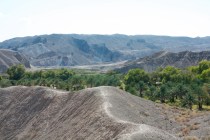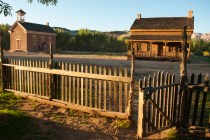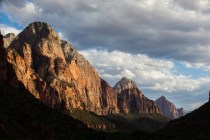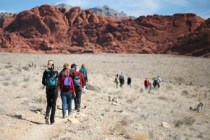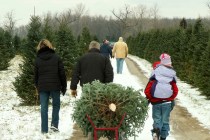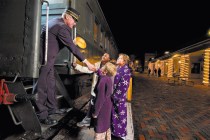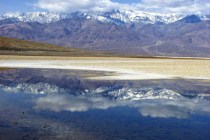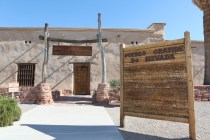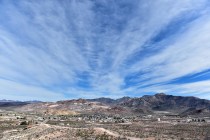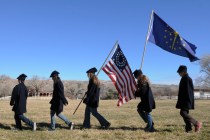State park preserves Ichthyosaur fossils
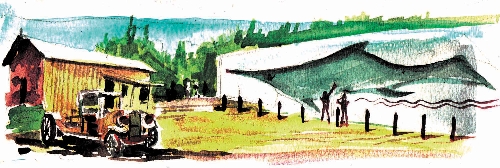
A unique pairing by the Nevada Legislature in 1957 created Berlin-Ichthyosaur State Park in Central Nevada.
The 1,540-acre park couples a remote 1890s ghost town with a nearby fossil deposit of huge marine reptiles that lived in shallow seas 225 million years ago. The park offers picnicking, camping, all-terrain vehicle trails, hiking, mine tours and tours of the main fossil study area.
Berlin-Ichthyosaur State Park is 340 miles from Las Vegas in the foothills of the rugged Shoshone Range east of Gabbs in northwestern Nye County. To reach the park, head north on U.S. Highway 95 toward Hawthorne. At Luning, take Nevada Route 361 through Gabbs to the turnoff onto Route 844. The 23-mile paved route climbs a mountain pass, descends to cross a wide valley, then climbs again to the park situated at about 7,000 feet amid a forest of pinyons and junipers.
Among the scores of ghost towns and old mining camps scattered across Nevada, Berlin is the only one protected as a state park. Its proximity to the fossil beds discovered in the 1920s ensured its survival, as the fossil deposits gained international attention when excavated in the 1950s and ’60s. Listings of the ghost town on the National Register of Historic Places and the fossil beds as a Registered National Landmark underscore the importance of the resources protected in the park. Expect to pay an entrance fee: $5 for Nevada residents and $7 for others.
Mining in the area started with discovery of silver in Union Canyon in 1863, giving rise to a handful of camps, including Union, Ione and Grantsville. Although Berlin Canyon yielded promise of gold ore as early as 1869, mining activity there was slow to develop. It wasn’t until 1896 that the Berlin Mine was established. In 1898, the Nevada Co. bought the mine and surrounding claims.
Berlin soon became home to 200 to 250 people housed in wooden buildings. Most worked in the mine tunnels or in the mill that processed the ore. Others kept the few stores, bars, eateries, medical clinic, school, livery stable and cathouse. A few townsfolk took up permanent residence in the cemetery at the edge of town. Berlin thrived until 1908, when mining declined. Moribund by 1911, Berlin lay abandoned, destined to become forgotten ruins like neighboring Union.
Today, Berlin stands in a state of arrested decay. Visitors wander among the remaining buildings, following interpretive signs and peering through windows at rooms still furnished as if residents had just stepped out. Join a guided tour of the mill and the Diana Tunnel. Mine tours are offered at 11 a.m. and 1 p.m. May 1 to Sept. 30 on Fridays, Saturdays and Sundays. Tours cost $3 for adults and $2 for children 6 to 12. Children younger than 6 tour free.
A 14-unit campground lies between the old town and the fossil beds, available on a first-come basis. Each unit has a covered table, fire pit, grill and access to water and restrooms. Some sites accommodate large recreational vehicles. There are no hookups. An overnight stay costs $15 for Nevadans and $17 for nonresidents.
Reportedly, a few early miners in Berlin built their hearths out of oddly shaped stones they found here and there. In the 1920s, a Nevada woman collected a few of these relics and showed them to scientists at a California university. She persisted until someone paid attention.
In 1928, an expert identified the fossils as remains of ichthyosaurs, marine reptiles found nearly everywhere except Antarctica. However, the size of these fossils indicated creatures far bigger than those found anywhere else. Subsequent excavations revealed creatures 50 feet in length, lying encased in ancient muck where their huge bodies had washed ashore. So far, more than 40 skeletons have been identified. Officially named Shonisaurus popularis, the relics of the age of dinosaurs became Nevada’s official fossil.
A large-roofed structure with observation windows covers the main excavation area. Tours are offered for the same fees as the mine tour, scheduled at 10 a.m. and 2 p.m. daily in the summer on weekdays and at 10 a.m., noon and 2 p.m. on weekends. The fossil tours are offered weekends only from mid-March to Memorial Day and from Labor Day to mid-November.
Margo Bartlett Pesek’s column appears on Sundays.



